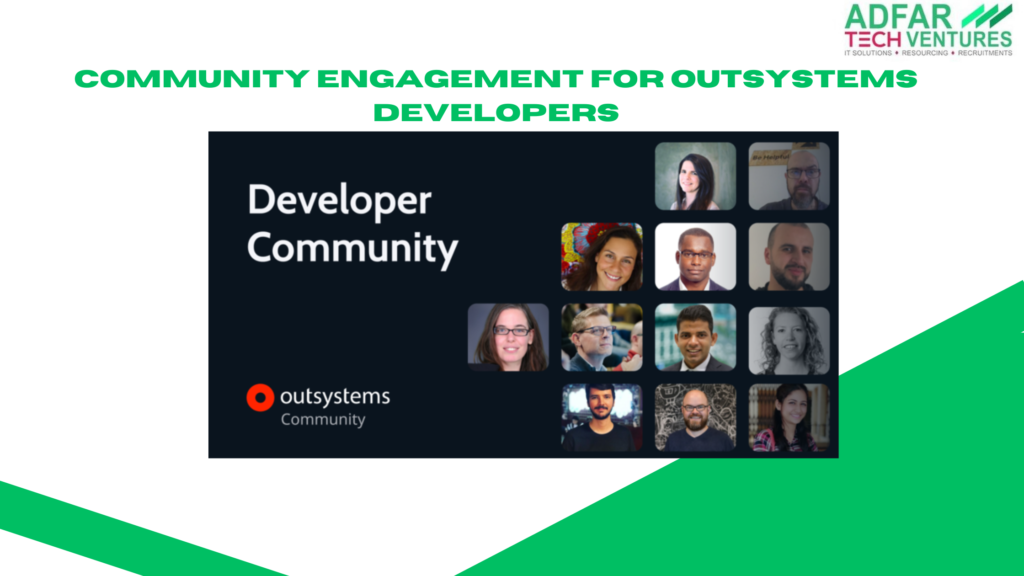
For OutSystems developers, community involvement is an essential component of their professional development. Developers can take advantage of networking opportunities, cooperative problem-solving, and shared knowledge by joining the broader OutSystems community. Being well-represented in the community not only improves one’s own abilities but also helps the OutSystems ecosystem expand.
The following are essential tactics for OutSystems developers to effectively engage with the community:
1. Take part in discussion boards and forums:
Participate in the OutSystems discussion boards and community forums where developers exchange ideas, pose queries, and offer answers.
Participate actively by responding to questions, exchanging best practices, and holding debates on a range of OutSystems development-related subjects.
2. Attend Meetups and Conferences:
To network with other OutSystems users, go to local and international meetups, user organizations, and conferences.
OutSystems fans, industry specialists, and developers.
Take part in talks, seminars, and networking events to increase your knowledge and make useful contacts in the community.
3. Participate in Open Source Initiatives:
Participate in open-source OutSystems development initiatives. Giving back code, documentation, or even bug reports is a great way to work with people and demonstrate your abilities.
Engaging in open-source initiatives can help you become more known and respected in the OutSystems community.
4. Compose Tutorials and Blog Posts:
Contribute your knowledge, perspectives, and experience by creating blog entries or OutSystems development lessons. Medium and the OutSystems Community Blog are great venues for publishing content and expanding your readership.
In addition to making you a community leader, producing insightful content aids in the education and development of other developers.
5. Engage Social Media:
On social media, adhere to OutSystems and associated hashtags networks such as LinkedIn and Twitter.
Talk to other developers and share your accomplishments and intriguing discoveries. A simple and efficient approach to keep informed and involved in the community is through social media.
6. Engage in Cooperation on GitHub Repositories:
Examine OutSystems development-related GitHub repositories and make contributions to projects that pique your interest.
Working together on shared projects promotes cooperation, introduces participants to various coding techniques, and lets them receive helpful criticism from other participants.
7. Take part in hackathons and OutSystems challenges:
Take part in OutSystems hackathons and challenges to put your knowledge to the test, work on real-world issues, and show off your inventiveness.
Participating in these activities improves your capacity for problem-solving while also giving you the chance to pick up tips from seasoned mentors and learn from other attendees.
8. Guide and Receive Guidance:
As you share your skills and assist less seasoned developers in the community with their OutSystems journey, consider taking on a mentorship role.
Seek mentorship from more seasoned developers to get their perspectives, direction, and tailored advise on enhancing your abilities.
9. Make and Distribute Components:
Create modular parts and post them to the OutSystems Forge or other community repositories.
By offering ready-to-use solutions, contributing components not only helps the community but also positions you as an ecosystem contributor.
10. Attend User Groups for OutSystems:
Join a local or online OutSystems user group, where developers get together on a regular basis to discuss issues, exchange experiences, and gain knowledge.
Participating in user groups promotes a feeling of community and offers chances for in-depth conversations on particular OutSystems subjects.
Important to have Community Engagement for Outsystems Developers
Community Involvement Is Critical for OutSystems Developers for OutSystems developers, community interaction is a crucial aspect of their career path, with several benefits that support individual and group development. Developers can access a network of shared information, collaborative opportunities, and a friendly atmosphere that encourages creativity and ongoing learning as they become fully involved in the lively OutSystems community.
Benefits of Involving the Community:
1. Information Exchange and Education:
By participating in the OutSystems community, developers can exchange information and gain insight from one another.
Community gatherings, forums, and cooperative talks provide insightful information about cutting edge techniques, creative solutions, and actual problem-solving situations.
2. Opportunities for Networking:
Participating actively in the OutSystems community makes it possible to network with other developers, business leaders, and possible partners.
In addition to facilitating partnerships and the flow of ideas, networking also builds a sense of community within a network of like-minded professionals.
3. Recognition and Visibility:
Participating in community initiatives, forums, and conversations raises a developer’s profile inside the OutSystems ecosystem.
Acknowledgment from colleagues and business experts can result in speaking engagements, job openings, and a favorable influence on
one’s brand in the workplace.
4. Cooperation in Open Source Initiatives:
Developers can work together on common topics by participating in open source projects, which helps the OutSystems ecosystem expand.
In addition to broadening one’s skill set, collaborative coding allows one to demonstrate their knowledge to a larger audience.
5. Improvement of Skills:
Developers can put their skills to the test through challenges, hackathons, and collaborative projects offered by community involvement.
Exposure to a variety of problem-solving scenarios and feedback from more seasoned peers expedites the development of new skills and OutSystems platform competence.
The Drawbacks of OutSystems
Although OutSystems is an effective low-code development environment, there are several issues and restrictions to be aware of:
1. The Learning Curve:
When switching to the OutSystems platform, some developers could first experience a learning curve, particularly if they are used to conventional coding techniques.
This difficulty can be lessened with community support and training, but it’s crucial to understand the adjustment time.
2. Restrictions on the Platform:
Although OutSystems supports a broad spectrum of application development requirements, there can be situations in which the platform is unable to handle extremely complicated or specific requirements.
To make sure that the project requirements match the capabilities of the OutSystems platform, developers must thoroughly assess the requirements.
3. Complexity of Customization:
Applications that are extremely complex and customized may have difficulties operating within the limitations of a low-level programming language.
It takes great thought and preparation to strike a balance between platform limitations and customisation requests.
